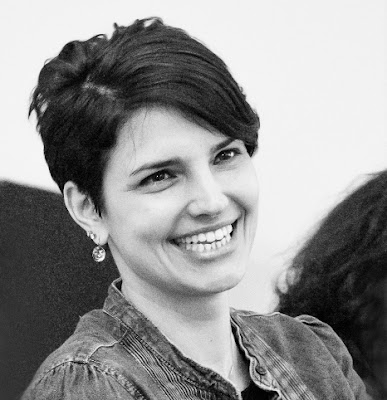“I can never follow my own instructions as well as my singers do” - Interview with Dóra Halas conductor
KultPult SALON - Dora Halas never dreamt of becoming a conductor. When
she was young, she just liked to sing and play the piano. Today she is a
successful musician, who has founded her unique choir Soharóza ten years ago.
 Dr. Dóra Halas gained a degree in Choral Conducting and Music Teaching, and a DLA
title at the Budapest Music Academy specializing in choral improvisation. After
working with traditional choirs and receiving international prizes, she moved
onto a more experimental field. The ensembles she founded all revolve around
her newly developed methodology of collective choral composing. Her current and
most successful ensemble is Soharóza,
who have premiered innovative performances, fusing different arts and genres.
Her aim is to make performers into actual creators of a project on all levels.
Dr. Dóra Halas gained a degree in Choral Conducting and Music Teaching, and a DLA
title at the Budapest Music Academy specializing in choral improvisation. After
working with traditional choirs and receiving international prizes, she moved
onto a more experimental field. The ensembles she founded all revolve around
her newly developed methodology of collective choral composing. Her current and
most successful ensemble is Soharóza,
who have premiered innovative performances, fusing different arts and genres.
Her aim is to make performers into actual creators of a project on all levels.
 Mariann Bencze, hostess of “KultPult SALON” is a graduated journalist, PR consultant, teacher of Hungarian
literature and linguistics - since 2003 active in the field of publishing,
public relations and organization of events.
Mariann Bencze, hostess of “KultPult SALON” is a graduated journalist, PR consultant, teacher of Hungarian
literature and linguistics - since 2003 active in the field of publishing,
public relations and organization of events.
Written by: Mariann Bencze
She has built a team, with
which she can truly cooperate on all levels: Dora does not rule over the
ensemble, instead she makes the members part of the creative process with her
special methods. Presently she has two “catwalk-concerts” running with
Soharóza: Taboo Collection was first
performed two years ago and The Issue is
their new production from this year, where she worked together with costume
designer Fruzsina Nagy.
In the first interview in a
brand new KultPult-column on the blog of Lean in Femspace in Vienna, you can
learn about living in Hungary and abroad, about a leadership not typical of
women, Dora’s ability of building a community and her special method named
KOMP.
– Most girls like
to sing and dream of becoming singers when they grow up; but how many girls
follow the dream of becoming conductors?
I liked to sing, but I
never thought of becoming a conductor. Apparently, I kept gathering people
around me to sing WITH me. What’s even more peculiar: I didn’t notice this at
the time. I just thought – at the age of 21, while studying Mathematics and
English at university – that I don’t only enjoy singing in a choir, but I seem
to understand and physically soak in every single word the conductor says
(thank you, Gábor Hollerung, again!), while others are chit-chatting through
this process. I am not good enough in any instrument, so what’s left there for
me? Music teaching and conducting – that was the only course at the Music
Academy that seemed to fit me, where you didn’t have to be an expert in one
specific thing, just have sufficient knowledge of basically everything: a
little bit of piano, a little bit of music history and music theory, singing,
and so on. But then already in second year I became the conductor of a
traditional chamber choir and a year later I co-founded my first experimental group.
– Do you also have
the desire to be on stage and sing? Usually we only see your choir performing –
do you ever step on stage with them?
Yes, I do, many times, but
not when we perform theatrical pieces or catwalk-concerts. I enjoy conducting,
but only if my presence and conducting really makes a difference in the output.
In the more theatrical shows, I think it’s important not to take away any
attention from what the singers or performers have to give, they must learn to
do everything by themselves, without any help from the conductor, once they are
on stage. In other cases, I have a very specific function: in improvised pieces
or workshops I need to show them the musical framework, or indicate time for
them; in more traditional concerts I like to connect with them live on stage to
motivate them to express the content, the feelings and thoughts behind the
music as much as possible; sometimes I sing with them too, but I have come to
realize that I can never follow my own instructions as well as my singers do.
Plus whenever I step into the choir as a singer, I become the naughtiest
member, it must be some kind of a psychological liberation and an overwhelming
feeling of enthusiasm that I experience at such times. It makes me feel like
I’m a young girl again.
– By stepping into
the choir from time to time during the course of a workshop or project, you
communicate that flat hierarchy works well between a choir and its conductor.
Does it really work?
As a whole I prefer a flat
organizational structure – simply because I believe that everyone’s input is
valuable to the same extent and that by sharing responsibility with them, they
become more involved. If I am told to clean up my room, because it will look
nicer then, I may be reluctant to do it and may not do a good job of it. But if
I feel the necessity myself and I can do it the way I want to, I will not only
get a much better result, but I may even enjoy the process. So as a leader of a
group it is my job to provide the possibilities that the choir members can
relate to and offer them the chance to fill it up with content. However, I must
say that the final decision-making lies with the leader. The members can put
forward their ideas as ingredients of a pot of soup, but they must have trust
in the leader – and the leader must take full responsibility – to blend their
flavours to produce a high-quality dish.
– What are the
characteristics of the special method you call KOMP?
KOMP is short (and
Hungarian) for “Collective Composing”. By composing, I don’t just mean the act
of composing music, but composing a structure, a theme, a line of dramaturgy –
composing as in piecing together, compounding, adjusting, arranging, just like
the etymology of the word implies. We have experimented with numerous
exercises, where the singers can feel free to submit their musical ideas.
Soharóza
Basically it is a series of
games. It’s simple playing. You receive a set of rules – different for each
exercise – and you just follow along those lines. Sometimes the rules are very
strict and keep your hands tied, at other times you are much more free to
wander around in the game.
For choirs and students,
the exercises can be used as a practical toolkit for development of intonation,
sense of rhythm, aural skills, voice formation, paying attention to each other,
creativity, increasing individual performance. But what I find the most
interesting is when you start off from these simple games and slowly work
through them by alterations, fine-tuning and suddenly find yourself with a
piece of music, which is exciting enough to be shown to the public. Then we’ve
done real composing.
– How do choir
members react to KOMP when they experience your methods in practice?
In my own choir we have ups
and downs. Some experiments work really well and we immediately get a good
result, I see bright eyes and concentrated faces. At other times, the exercise
is too hard, or people are just not in the mood for it, or there is simply no
creative vibe in the air. This can happen and there is nothing wrong with that.
We can always learn from these, make conclusions and improve. I myself
constantly have the urge to renew myself and my methods when working with my
own choir, which is sometimes tiring, but at the same time this inner
provocation is what pushes us in the direction of innovation at all times. On
the other hand, the reason I enjoy doing workshops for people with no
experience with such activity is because for that short amount of time, the
level of enthusiasm and participation is extremely high, simply because of its
novelty.
– Your cooperation
with the choir Soharóza and costume designer Fruzsina Nagy in the catwalk
concerts has yielded a new genre. Were you aware of the fact that with Taboo
Collection and The Issue a new genre will be created?
When we started working on Taboo Collection, we were not aware of
this at the beginning. It was during the process, when we had to make important
decisions in directing the piece that slowly-slowly we came to realize that
this performance must be a catwalk-concert. Not a theatre play, not a concert
with strong visuals, not a fashion show with live music – but a
catwalk-concert, where the two art forms (choral music and costume design) need
to go hand in hand, one inspiring the other in the same amount. There was no
subordination and I think this is what makes it work.
Taboo Collection
– The
catwalk-concerts have performed not only in Budapest, but also toured in other
parts of Hungary and abroad. What are your plans now?
We are just about to
celebrate the 10th anniversary of the Soharóza choir. Soharóza (and myself)
have proved ourselves very effective in cooperating with representatives of
other art forms – let that be a gastroblogger, a costume designer, a historian,
a media artist or a theatre director –, so I think it is time we start letting
our musical self grow and return to organizing music concerts with no extra
layer. In addition, as a third facet of our operation, I would like to turn my
attention to pedagogy with the help of some of my choir members, as much for
children as for conductors or teachers, and for any adult groups that wish to
sing and experiment with music-making. It is a somewhat hidden dream of mine
too to be able to work on a more regular basis with Fruzsina Nagy as a catwalk-concert duo and be invited to theatre
companies or any performing groups, who wish to enrich their own repertoire
with a catwalk-concert.
– You have
experience both of living abroad and building a community. How did you manage
to connect with new communities during your years abroad?
I lived 4 years in Syria
when I was very young and almost 6 years in Cyprus during my teenage years. In
Syria, I just followed my parents everywhere, but already then I experienced
the presence of a very strong community between Hungarians living in Damascus,
with constant cultural programmes, educational trainings for the children,
parties and dinners between the families. I don’t have real memories from back
then, only flashbacks on a deep and unconscious level (emotions, sense of
smell, sounds). In Cyprus I started founding my own singing groups and bands,
throwing concerts at the school theatre, doing musicals, participating in
team-building programmes organized by the English-speaking community of the
local church, taking on organizing and leading roles there. I don’t seem to
remember any difficulties, not even when we moved back to Budapest at the age
of 17.
My last experience abroad
was just recently: we spent four years in Vienna with my family. With two very
young children on my back, I was mostly at home with them or running back to
Budapest to manage Soharóza. So we got caught up in making kindergarten pals
mostly and having friends and family and the choir visiting from Hungary almost
every weekend throughout the four years, sometimes with 20 people staying at
our flat, sleeping like sardines in a can on the floor. It was a fun four
years.
– Do you also
apply the KOMP method with your own children at home?
I don’t do any specific
training at home. I believe the best way for children to learn and develop is
by experience and free experimenting. The kids see us playing instruments, they
hear me singing a thousand different songs and making all sort of strange noises
without end, we have numerous different music instruments, a Clavinova (with
demo programmes) and a collection of wonderful vinyl records in our home; they
come to my choir concerts, we travel, we show them as much as we can of the
world – so basically we just pass on our own enthusiasm and let them build
their own.
But still, I would say
‘yes’ to your question: I do apply the KOMP method at home, because the most
basic principle of KOMP is to be open to any sound and be able to consider it
as music.
ABOUT
 Dr. Dóra Halas gained a degree in Choral Conducting and Music Teaching, and a DLA
title at the Budapest Music Academy specializing in choral improvisation. After
working with traditional choirs and receiving international prizes, she moved
onto a more experimental field. The ensembles she founded all revolve around
her newly developed methodology of collective choral composing. Her current and
most successful ensemble is Soharóza,
who have premiered innovative performances, fusing different arts and genres.
Her aim is to make performers into actual creators of a project on all levels.
Dr. Dóra Halas gained a degree in Choral Conducting and Music Teaching, and a DLA
title at the Budapest Music Academy specializing in choral improvisation. After
working with traditional choirs and receiving international prizes, she moved
onto a more experimental field. The ensembles she founded all revolve around
her newly developed methodology of collective choral composing. Her current and
most successful ensemble is Soharóza,
who have premiered innovative performances, fusing different arts and genres.
Her aim is to make performers into actual creators of a project on all levels.
KOMP collective choral composing is a methodology based on the practice
of choir IMPROVISATION and creative musical GAMES with human sounds, singing
and movement. It has been developed by Dora
Halas (DLA) and her choir Soharóza in Budapest,
Hungary through years of EXPERIMENTS. It can be used:
- to expand the creative aspect of any musical group,
- to construct full concert repertoires for choirs,
- to open up people who want to sing, but have no experience,
- to loosen up amateur singers,
- to teach music to children or adults on any level in a fun way.
*****
 Mariann Bencze, hostess of “KultPult SALON” is a graduated journalist, PR consultant, teacher of Hungarian
literature and linguistics - since 2003 active in the field of publishing,
public relations and organization of events.
Mariann Bencze, hostess of “KultPult SALON” is a graduated journalist, PR consultant, teacher of Hungarian
literature and linguistics - since 2003 active in the field of publishing,
public relations and organization of events.
She has been living in Vienna
since 2011 and has started to teach children & adults. For several
years she is particularly interested in 2 topics: culture and communication, but
especially in people. She organizes Hungarian culture programs in Austria and also supports the
integration of kids from abroad. Since 2013, she has been active as a PR &
Employer Branding manager in Vienna.













Comments
Post a Comment